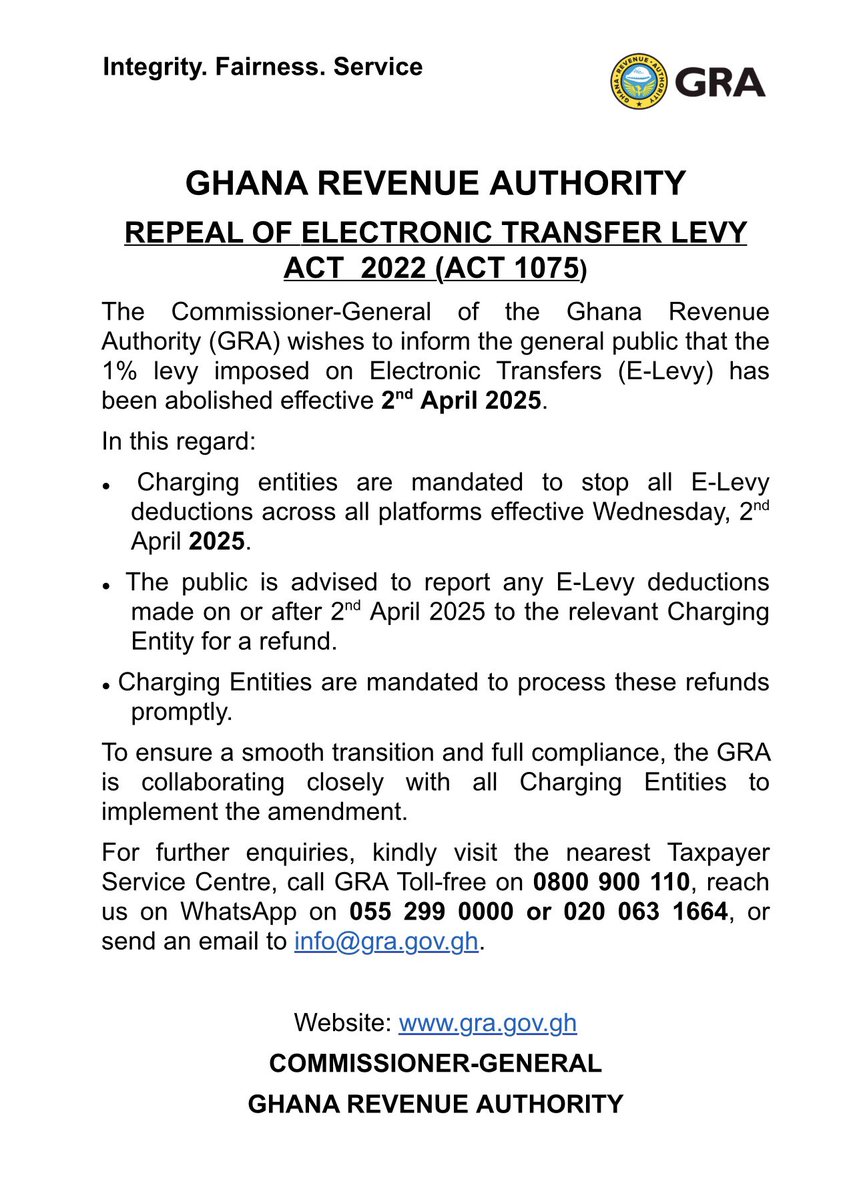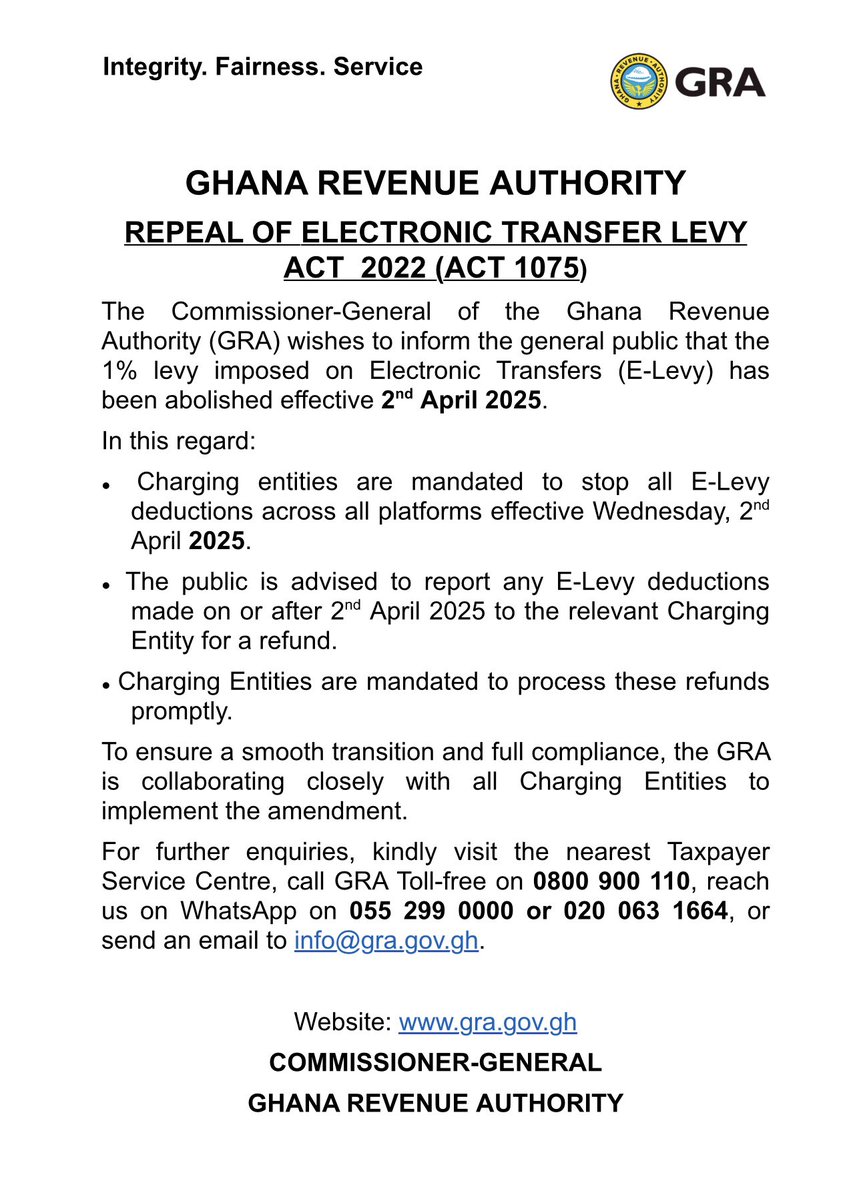Shocking Decision: E-Levy Repealed! Refunds and No More Charges!
E-Levy Repealed: Key Information and Implications
On April 2, 2025, the Ghana Revenue Authority (GRA) announced the official repeal of the Electronic Levy (E-Levy), a significant development for both individuals and businesses in Ghana. This decision has far-reaching implications for the economy and financial transactions in the country. Let’s delve into the specifics of this repeal, its background, and what it means for citizens and businesses moving forward.
What is the E-Levy?
The E-Levy was introduced by the Ghanaian government as a tax on electronic transactions, including mobile money transfers, bank transfers, and other digital payment methods. The levy was initially aimed at increasing government revenue and funding various developmental projects. However, it faced significant backlash from the public and businesses, leading to widespread protests and calls for its repeal.
Key Details of the Repeal
Following the GRA’s announcement, several critical points regarding the repeal of the E-Levy were highlighted:
No More Charges
Effective immediately from April 2, 2025, all entities are mandated to cease charging the E-Levy. This includes financial institutions, mobile money operators, and other platforms that previously applied the levy to electronic transactions. The end of this levy is expected to reduce the cost of digital financial services, making them more accessible to the general public.
- YOU MAY ALSO LIKE TO WATCH THIS TRENDING STORY ON YOUTUBE. Waverly Hills Hospital's Horror Story: The Most Haunted Room 502
Refunds for Previous Deductions
The GRA has stipulated that all deductions made under the E-Levy from the second quarter of 2025 onward must be refunded. This means that individuals and businesses who have incurred charges related to the E-Levy during this period will be eligible to claim refunds. The process for claiming refunds will require customers to report directly to the charging entities, ensuring that those who were impacted can recover their funds.
Claiming Your Refund
To facilitate the refund process, consumers who have been charged the E-Levy are encouraged to reach out to the entities that applied the levy on their transactions. The GRA has provided clear instructions for how to report these charges and initiate the refund process, ensuring that affected individuals can reclaim their money without undue difficulty.
Implications of the E-Levy Repeal
The repeal of the E-Levy carries several implications for the Ghanaian economy and its citizens:
Economic Relief
For many Ghanaians, the E-Levy represented an additional financial burden, particularly for low- and middle-income earners who relied heavily on mobile money for everyday transactions. The repeal is expected to provide economic relief by reducing transaction costs, thereby encouraging more people to engage in digital financial services without the fear of additional charges.
Encouragement of Digital Transactions
With the elimination of the E-Levy, there is potential for an increase in the volume of digital transactions. This change could lead to greater financial inclusion, allowing more individuals to utilize mobile banking and online payment systems. As digital transactions become more attractive without the added cost, businesses may also benefit from increased sales and customer engagement.
Impact on Government Revenue
While the repeal may provide immediate benefits to consumers, it raises questions about the government’s ability to generate revenue. The E-Levy was initially introduced to bolster government funding for various projects. Policymakers will need to explore alternative revenue sources to compensate for the loss of income generated by the E-Levy.
Future of Digital Taxation
The repeal of the E-Levy opens up discussions about the future of digital taxation in Ghana. Stakeholders, including government officials, economists, and industry leaders, will need to engage in dialogue about how to create a balanced approach to taxation that supports economic growth while ensuring that the government can meet its funding needs.
Conclusion
The repeal of the E-Levy marks a pivotal moment for Ghana, impacting both consumers and businesses alike. As effective April 2, 2025, the cessation of E-Levy charges is expected to alleviate financial burdens on citizens, promote digital transactions, and potentially transform the landscape of electronic payments in the country.
The promise of refunds for previous deductions adds an essential layer of accountability and consumer protection, ensuring that individuals are not left at a loss due to the now-repealed levy. While there are concerns about the government’s revenue generation, the focus will likely shift toward finding sustainable alternatives that support economic growth without hindering financial inclusivity.
As Ghana navigates this new chapter following the E-Levy repeal, the emphasis will be on fostering a robust digital economy that benefits all citizens while also ensuring that the government can sustain its operations and developmental objectives. The discussions surrounding digital taxation will continue, and the outcomes will play a crucial role in shaping the future of financial transactions in Ghana.
In summary, the repeal of the E-Levy is a significant step towards enhancing financial accessibility, promoting digital transactions, and addressing the concerns of citizens regarding additional taxation on electronic payments. As the country moves forward, it will be essential to strike a balance between fostering economic development and ensuring that government revenues remain stable.

E-LEVY SCRAPPED!
Effective April 2, 2025, the E-Levy is officially repealed!
•No More Charges: Entities must stop charging E-Levy.
•Refunds: Deductions from 2nd 2025, onward must be refunded.
•Claim Your Refund: Report to the charging entity for a refund of E-Levy… pic.twitter.com/qrBpq29feU— GRA (@GhanaRevenue) April 3, 2025
E-LEVY SCRAPPED!
If you’ve been following the news from Ghana, you might have caught the exciting announcement that has everyone buzzing: the E-Levy has officially been repealed! Effective April 2, 2025, this change marks a significant shift in how digital transactions are taxed in the country. This move comes as a relief to many Ghanaians who have expressed concerns over the financial burden the E-Levy imposed on everyday transactions.
Effective April 2, 2025, the E-Levy is officially repealed!
The Ghana Revenue Authority (GRA) has made it clear that effective from this date, all entities must cease charging the E-Levy. This decision has sparked joy among citizens who felt that the levy was an additional strain on their already tight budgets. The E-Levy was introduced to generate revenue, but it quickly became a point of contention among the populace.
With the repeal of the E-Levy, Ghanaians can look forward to a more straightforward digital transaction landscape. No longer will they be faced with unexpected charges every time they send or receive money through mobile money platforms. This is a huge win for consumers, and it’s hard not to feel excited about the implications this repeal holds for the future of digital payments in Ghana.
No More Charges: Entities must stop charging E-Levy.
One of the most significant changes that come with the repeal is the immediate cessation of any E-Levy charges. This means that businesses and service providers must stop applying this tax to transactions. The GRA has emphasized that compliance with this new guideline is crucial. Failure to adhere to these changes could result in penalties or further regulatory actions against businesses.
For consumers, this means peace of mind. You won’t have to worry about those pesky deductions every time you conduct a simple transaction, whether it’s sending money to a friend or paying for services. The financial landscape is changing, and it’s about time consumers got a break!
Refunds: Deductions from 2nd 2025, onward must be refunded.
But that’s not all! For those who have been subjected to the E-Levy charges, there’s good news on the horizon. Starting from April 2, 2025, any deductions made under the E-Levy will need to be refunded. This decision is a huge step in rectifying the financial strain that many have experienced over the past months and years.
It’s essential for affected individuals to know that they can claim these refunds. The GRA has advised consumers to report to the charging entity to initiate the refund process. This means that if you’ve been charged the E-Levy during its operation, you have the right to get your money back. It’s all about ensuring fairness and accountability, and this move is undoubtedly a step in the right direction.
Claim Your Refund: Report to the charging entity for a refund of E-Levy.
So, how do you go about claiming your refund? It’s relatively straightforward. The GRA has laid out a clear process for consumers. Just head over to the charging entity—whether it’s your bank or mobile money service provider—and let them know you’re looking to claim your E-Levy refund. It’s that simple!
Make sure you have any necessary documentation on hand, such as transaction records or receipts that show the E-Levy deductions. Keeping track of your financial transactions is always a good habit, and in this case, it will make the refund process smoother. If you need more information on how to navigate this process, check out the GRA’s official announcements or their website for detailed guidelines.
The Impact of the E-Levy Repeal on Ghanaians
The repeal of the E-Levy is expected to have far-reaching effects on the Ghanaian economy and its citizens. With the elimination of this tax, many are hopeful that it will lead to increased spending power among consumers. The extra money that was once drained by E-Levy deductions can now be reinvested into local businesses or used to meet everyday needs.
Moreover, this change could potentially stimulate the digital payments sector. Without the E-Levy, more people might feel encouraged to engage in digital transactions. This could lead to greater financial inclusion and innovation within the fintech space in Ghana. It’s an exciting time for the economy, and the possibilities are endless!
Public Reaction to the E-Levy Repeal
Public sentiment regarding the repeal of the E-Levy has been overwhelmingly positive. Many Ghanaians took to social media to express their relief and gratitude. The hashtag #ELevyScrapped has been trending, showcasing the collective joy of individuals who felt burdened by the charges.
People are sharing their stories of how the E-Levy affected their daily lives. From small business owners to everyday consumers, the narrative is consistent: the tax made life harder. Now, with its removal, there’s a sense of hope and optimism for a brighter financial future.
The Future of Digital Transactions in Ghana
Looking ahead, the future of digital transactions in Ghana seems bright. The repeal of the E-Levy could pave the way for more innovative solutions and services in the fintech industry. Companies may now be more inclined to develop user-friendly platforms that promote seamless transactions without the fear of additional charges.
Additionally, with the government no longer relying on the E-Levy for revenue, there’s an opportunity for them to explore other avenues for generating income. This shift could lead to more sustainable economic practices that benefit both the government and its citizens.
Conclusion: A New Era for Ghanaians
The repeal of the E-Levy is indeed a significant milestone for Ghana. It’s not just about the removal of a tax; it represents a shift towards a more consumer-friendly financial environment. As Ghanaians prepare to navigate this new landscape, it’s essential to stay informed about the changes and how they can benefit from them.
Whether you’re looking to claim your refund or simply enjoy the freedom of transaction without the E-Levy, this is a moment to embrace the positive changes ahead. So, let’s celebrate this victory and look forward to a future where digital transactions are not only easier but also more accessible for everyone!

